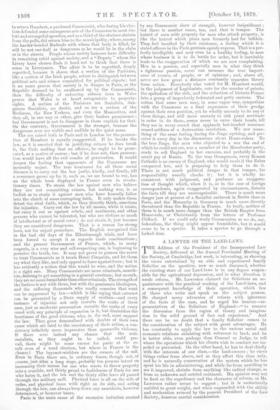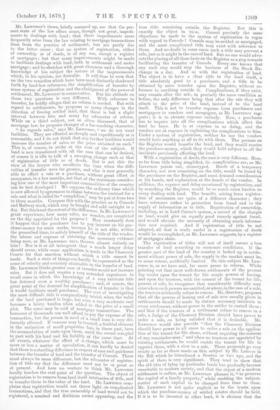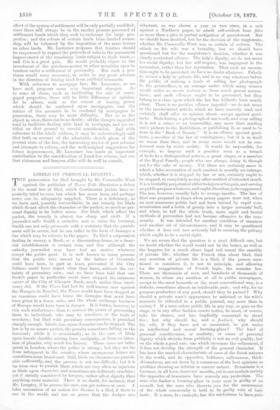A LAWYER ON THE LAND-LAWS.
THE Address of the President of the Incorporated Law Society, delivered at the Annual Provincial Meeting of the Society, at Cambridge, last week, is interesting, as showing the views entertained by an able and experienced family Solicitor on the question, now so much discussed, whether the existing state of our Land-laws is in any degree respon- sible for the agricultural depression, and in what direction it needs reform. Mr. Lawrence claimed for Solicitors an ac- quaintance with the practical working of the Land-laws, and a consequent knowledge of their operation, which few of those who write and speak on the subject possess. He charged many advocates of reform with ignorance of the facts of the case, and he urged his hearers—re- presentatives of the Solicitors of England—" to remove the discussion from the region of theory and imagina- tion to the solid ground of fact and experience." And there can be no doubt that a family Solicitor comes to the consideration of the subject with great advantages. He has constantly to apply the law to the various social and economic relations subsisting with reference to land, and he is better able, even perhaps than Counsel or Judge, to tell where the operations which his clients wish to conduct are im- peded or prevented. On the other hand, he has to deal chiefly with the interests of one class,—the land-owners ; be views things rather from above, and as they affect this class only, and he is naturally conservative of the system which he has spent his life in administering, and while far from unwilling to see it improved, shrinks from anything like radical change, as from an unknown and untried continent. His opinion may not be final on the expediency and the character of reform, as Mr. Lawrence rather seems to suggest ; but it is undoubtedly entitled to great weight, and when expounded with the ability and moderation evinced by the present President of the Law Society, deserves careful consideration.
Mr. Lawrence's views, briefly summed up, are that the pre- sent state of the law offers some, though not great, impedi- ments to dealings with land ; that these impediments more frequently arise from the law relating to mortgage transactions than from the practice of settlement, but are partly due to the latter cause ; that no system of registration, either of ownership or of deeds, is of any use, except a register of mortgages ; but that many improvements might be made to facilitate dealings with land, both in settlement and under mortgage ; and he sketches with great clearness and a thorough knowledge of his subject the nature of the improvements which, in his opinion, are desirable. It will thus be seen that on the two remedies which have been most distinctly shadowed forth by land-law reformers, the simplification of transfer by some system of registration and the abridgment of the power of settlement, Mr. Lawrence is conservative. But his attitude on these two questions is very different. With reference to transfer, he boldly alleges that no reform is needed. But with regard to settlements, he proposes so many changes in the direction of freeing settled land, that there is but a slight interval between him and many lay advocates of reform. While on a third subject, not so often discussed, that of mortgage law, he proposes changes of a far-reaching character. "As regards sales," says Mr. Lawrence, " we do not want facilities. They are effected as cheaply and expeditiously as is reasonable, and I do not think that any further facilities would increase the number of sales, or the price obtained on each." This is, of course, to strike at the root of the subject. If land is now transferred with all the ease that can be desired, of course it is idle to talk of a sweeping change such as that of registration of title or of deeds. But is not this the view of the lawyer who recollects the time when the diffi- culties of transfer were far greater, and who is now generally able to effect a sale or a purchase, without great effort or annoyance, in a few montlis, not that of the statesman consider- ing how one of the most important commodities of the country can be best developed ? We suppose the ordinary time which is now allowed by agreement to elapse between the contract for a sale and what is called its " completion," may be put at from two to three months. Compare this with the practice as to Consols and Railway stock, which may be bought and sold outright in a day. But this is not the extent of the difference. In Mr. Lawrence's great experience, how many sales, we wonder, are completed on the day appointed for the purpose ? How constantly does it happen that the purchaser has to pay interest on his pur- chase-money for some weeks, because he is not able, within the prescrilied time, to satisfy himself of the title of the vendor, the labour and expense of obtaining the necessary evidence being now, as Mr. Lawrence says, thrown almost entirely on him ! Nor is it at all infrequent that a much longer delay should occur, while some application is made to the Chancery Courts for that sanction without which a title cannot be made. Such a state of things can hardly be represented as the acme of celerity and certainty attainable in the transfer of land. Mr. Lawrence thinks greater ease of transfer would not increase sales. But it does not require a very extended experience to recall cases in which the knowledge of a very intricate title has deterred even a wealthy purchaser, and, of course, the great point of the demand for simplification of transfer is that it would facilitate small purchases. The cost of investigating the most difficult title is comparatively trivial, when the value of the land purchased is large, but even a very moderate cost becomes a heavy burden when added to the price of a small plot. The same may be said of mortgage transactions. The borrower of thousands can well afford to pay the expense of the transaction but the person in need of a small loan is very dif- ferently affected. If rumour may be trusted, a fruitful element in the extinction of small properties has, in times past, been the accumulation of costs upon them, until the owner was glad to part with his land and his liability at the same time. At all events, whatever the effect of a change, which must be more or less a matter of speculation, it can hardly be denied that there is a startling difference in respect of ease and quickness between the transfer of land and the transfer of Consols. There must always be some difference, but the advocates of registra- tion of title say that the difference need not be so great as at present. And here we venture to think Mr. Lawrence hardly touches the real point of the question. The object of registration is to remove from land itself intricacies of title, and to transfer them to the value of the land. Mr. Lawrence com- plains that registration would not throw light on complicated transactions, and that the true ownership of land would not be registered, a nominal and fictitious owner appearing, and the true title remaining outside the Register. But this is
exactly the object in view. ' Cannot precisely the same objections be made to the system of registration in vogue with regard to Consols ? Consols may be settled or mortgaged, and the most complicated title may exist with reference to them. And no doubt in some cases such a title may prevent a sale, just as it might in the case of land. But no one would advo- cate the placing of all these facts on the Register as a step towards facilitating the transfer of Consols. Every one knows that any such step would stop the business of the Stock Ex- change in a day. And so with the registration of land. The object is to have a clear title to the land itself, a title absolutely good to a purchaser, and a title to be obtained by mere transfer upon the Register, without re- ference to anything outside it. Complications, if they exist, may remain after the sale, in precisely the same condition as before, the only difference being that after the sale they will attach to the price of the land, instead of to the land itself. This is not to transfer expense from purchasers and mortgagees to vendors and morgagors, as Mr. Lawrence sug- gests; it is to obviate expense entirely. Now, a purchaser has to inquire into all the complications which affect the land ho buys. He is at expense in so doing, and the vendors are at expense in explaining the complications to him. Under a system of registration, neither he nor the vendors would have anything at all to do with them. The persons on the Register would transfer the land, and they would receive the purchase-money, which they would hold subject to all the incidents previously affecting the land.
With a registration of deeds, the case is very different. Here, so far from title being simplified, its complications are, as Mr. Lawrence points out., stereotyped. Deeds of a temporary character, not now remaining on the title, would be found by the purchaser on the Register, and must demand consideration at his hands, and explanation at the hands of the vendor. In addition, the expense and delay occasioned by registration, and by searching the Register, would be so much extra burden on every dealing with land. The benefits arising from registra- tion of assurances are quite of a different character ; they have reference rather to protection from fraud and to the supply of information as to title. Registration of ownership, including, as in Lord Cairns's system' a record of the charges on land, would give an equally good remedy against fraud, and would obviate the necessity of obtaining much informa- tion now required. And if registration of title be not adopted, all that is really useful in a registration of deeds would be accomplished, as Mr. Lawrence suggests, by a register of mortgages alone.
The registration of titles will not of itself ensure a free transfer of land according to economic conditions. If the greater part of the land of the country is locked up in settle- ment without power of sale, the supply in the market must be, to some extent, artificially limited. On this subject Mr. Law- rence is, as we have said, far more prone to reform. While pointing out that most well-drawn settlements of the present day confer upon the tenant for life ample powers of leasing, and upon the trustees, with the consent of the tenant for life, powers of sale, he recognises that considerable difficulty may arise when such powers are omitted, or where,in the case of a sale, the trustees arbitrarily refuse to concur. He, therefore, proposes that all the powers of leasing and of sale now usually given in settlements should be made by statute necessary incidents tc every settlement, without power in the settlor to curtail them ; and that if the trustees of a settlement refuse to concur in a sale, a Judge of the Chancery Division should have power to
order a sale, on being satisfied that it is desirable. Mr. Lawrence would also provide "that the Chancery Division should have power in all cases to order a sale on the applica- tion of the tenant for life alone, without requiring the consent of any remainder-man ;" and when no trustees are appointed by existing settlements, he would enable the tenant for life to appoint them, with a view to a sale. These proposals go very nearly as far as those made on this subject by Mr. Lefev re in the Bill which he introduced a Session or two ago, and the spirit of them is very significant. They tend to show that the old idea of tying up particular lands has gradually become unsuitable to modern society, and that the object of a modern settlement is rather, as Mr. Lawrence phrases it, "to preserve the capital of a family property," while enabling the subject- matter of such capital to be changed from time to time. Mr. Lawrence is not quite explicit as to the trusts upon which the purchase-money of settled estates should be held. If it is to be invested in other land, it is obvious that the
effect of the system of settlement will be only partially modified ; since there will always be in the market poraons possessed of settlement funds which they seek to exchange for large pro- perties ; and the release of certain lands from limited Owner- ship, will be balanced by the imposition of the same fetters on other lands. Mr. Lawrence proposes that trustees should be empowered to expend the proceeds of sales in the permanent improvement of the remaining lands subject to their trust,— and this is a great gain. He would probably object to the investment of the purchase-money in other securities open to trustees under a settlement of personalty. But such a 'pro- vision would seem necessary, in order to any great advance in the direction of freeing land from artificial trammels. With reference to mortgage law, Mr. Lawrence, as we have said, proposes some very important changes. As to some of them, such as facilitating the sale of mort- gaged properties, there will he little difference of opinion. As to others, such as the extent of leasing power which should be conferred upon mortgagors, and the nature of the accounts to be rendered by mortgagees in possession, there may be more difficulty. But as to the object in view, there can be no doubt ; all the changes suggested tend to facilitate dealing with land in mortgage, and are en- titled on that ground to careful consideration. And with reference to the whole address, it may be unhesitatingly said that both on account of the admirable sketch given of the present state of the law, the interesting review of past reforms and attempts to reform, and the well-weighed suggestions for future improvement, Mr. Lawrence has made an important contribution to the consideration of Land-law reform, and one that statesmen and lawyers alike will do well to consult.




































 Previous page
Previous page